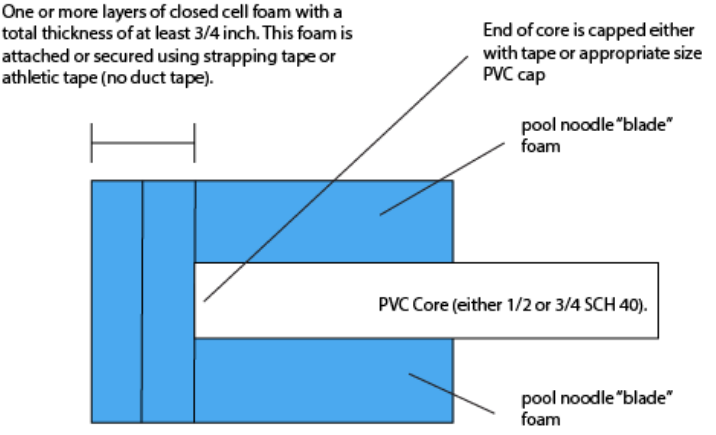
basic Thrusting Tip
For the thrusting tip that MUST be used on spear boffers longer than 62 inches or longer, check out the Enhanced Thrusting Tip.
basic thrusting tip blueprint

basic Thrusting Tip Rules
In addition to the rules outlined in the above diagram:
- All boffers that are intended to strike with the tip must have a thrusting tip. Thrusting tips are mandatory on swords, daggers, spears, staffs, and glaives. If an axe or a mace is intended to be used as a thrusting boffer, it must also have a thrusting tip.
- Thrusting tips must have at least 3/4 inch thickness and have ½ inch compression allowance in the foam. Allowed construction materials are the blue camping mat from Walmart and any other Marshal approved closed-cell foam.
- Thrusting tips must be secure with no allowance for slipping to the side, falling off, etc. If any PVC core becomes exposed, the boffer must immediately be pulled from play until the thrusting tip can be repaired.
- Thrusting tips may only be secured with strapping tape or athletic tape. They may not be decorated with paint, fabric, duct tape, etc. Markers may be used to decorate the thrusting tip, if the participant desires.
- At this time, thrusting tips may not be covered with any sort of fabric, sock, etc. that may hide it from view and inspection.
basic Thrusting Tip Construction
A thrusting tip is a very important part of any boffers that are used for “stabbing”-style tags. They are found on all swords, daggers, spears, and glaives. They can also be found on some axes and maces. The tip itself is a well padded area that is composed of two or more layers of soft foam padding (such as camping mat) to soften tags with this part of the boffer. Beneath the image are instructions on how to make a standard thrusting tip for many different kinds of boffer that can be found in the Blueprint Library.
Materials: The first thing you need to building a thrusting tip is the core of the boffer you are building (D). This should be ¾ inch or ½ inch schedule 40 PVC, depending on what kind of boffer you are building:
- Boffer cores or hafts: All boffers shall have a core composed of ¾ inch schedule 40 PVC. Sword boffers that are 42 or less inches in length may use ½ inch schedule 40 PVC.
In addition to the PVC core, you will need a PVC cap (C) that fits the type of PVC you are using. This cap can be of any schedule so long as it is appropriately sized and will not slip or fly off.
You will also need a length of pool noodle for the body of the blade (B). Make sure that your pool noodle has at least ½ inch of padding from the hole in the middle to the outer rim!
The last part are the two (2) foam discs that go on the end (A). A good type of foam for these is the blue camping mat that is sold in Walmart. It’s cheap and durable while also having some give. You will also need duct tape in a color of your choosing. Make sure that the foam discs match the diameter of the pool noodle you’re using!

1 Get tape ready. Measure and cut 2 pieces of strapping tape that are roughly 11″ long. This tape must be either strapping tape or athletic tape; duct tape tips will be denied for field use. Take one if the pieces and tear it in half in the middle. Then, take these two shorter pieces and tear them in half lengthwise (E).
If you are using athletic tape, you may not have a strip as wide as is shown for tape (F). If this is the case, simply prepare one extra long piece of athletic tape (roughly 22-26″ in length) to wrap a few times around the thrusting tip.

2 Attach PVC cap. Next, take the PVC cap (C) and firmly attach it to the PVC core (D). It should not fall off. In fact, ideally it should be difficult to remove without a tool.
Once the PVC cap is secure, move the blade portion of the pool noodle (B) upward. This is best done in a spiraling motion so that the pool noodle does not tear. Move the pool noodle until it is flush with the top of the PVC cap.

3 Affix the discs. Make sure that the PVC core (D) and cap (C) are sitting flush (but not pressing hard) against the disks. Next, use the smallest pieces of tape (E) to attach both blue discs (A) to the pool noodle (B). Following the “star” diagram, use all 4 pieces of small tape (E) to securely attach the blue disks (A) to the pool noodle (B). By the time you are done, there should be very little blue disk visible.
Don’t tighten the (E) pieces of tape too much! They should be snug, but not tight. If you tighten the tape too much, the foam will become rigid and inflexible, defeating the purpose of the padding.
The pieces of tape that you use to make this “star” shape does not have to connect to the haft (D). As long as they connect the disc (A) securely to the pool noodle (B), you should be good!

4 Lock down the star. After the first large piece of tape is secured and ready, take the large piece of tape (F). Keep it close to the top, about 1/4 inch away from the end of the thrusting tip. Wrap this around to lock all of the smaller pieces of tape down (but not too tight!).
Be especially careful of over-tightening if you are using athletic tape and wrapping it around. It can be very easy to compress the tip too much and take away the squishy-ness that makes it safe.
After that, give the thrusting tip a little test by pulling and pushing it around a bit, ensuring that it will not fly loose. If it holds up, it will work! If you’ve followed these instructions carefully, your pommel will pass inspection.


